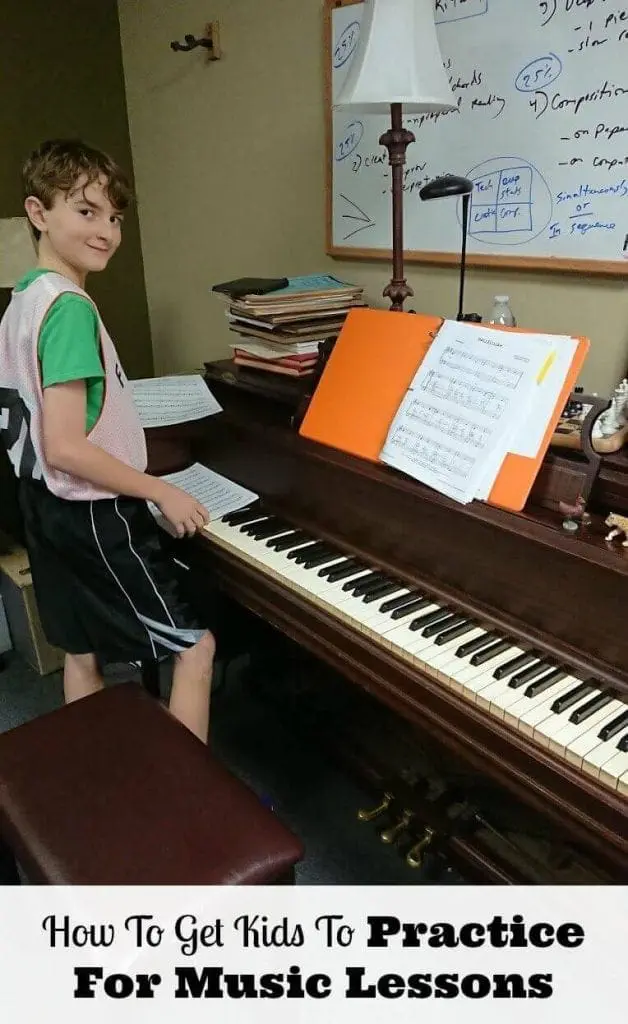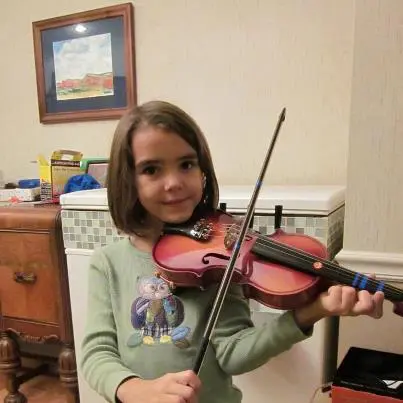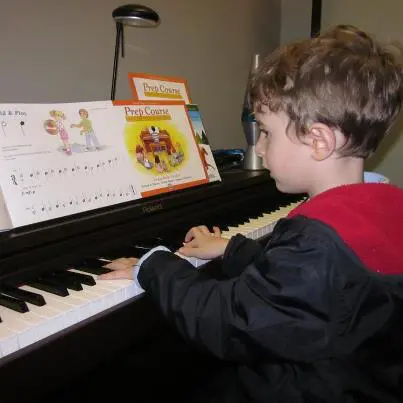Music can be an enriching experience for children. While many children enjoy listening to music, getting kids to practice for music lessons may take some convincing. One of the keys to make learning an instrument enjoyable is to make it seem like less of a chore. My son has been taking piano lessons for 6 years so I have learned a lot about how to make piano practice fun. Here are a several creative ways for how to get kids to practice music.
8 Ways To Get Kids To Practice For Music Lessons

Getting kids to practice their musical instruments can be tricky, but here are some strategies to make it easier and more enjoyable.
1. Set Goals For Music Practice
Make each practice session count. Setting goals or benchmarks can give kids a sense of accomplishment. Divide the session into various stages. Some of the time can be divided into learning particular bars of music, practicing scales or other aspects of musical training.
2. Encourage Kids to Love Music
Children have a hard time enjoying themselves when it’s something they’re not interested in. Practice time can be a bit of a struggle. To help with this, try introducing your child to the genre of music they are playing. Engage them in conversations about music. If your child is playing classical music, let them watch cartoons that feature that type of music. Children who have an interest in the music they’re playing are generally much more willing to practice it.
3. Offer Motivation For Your Kids To Practice
Positive reinforcement is a strong motivator. Using charts, stickers and rewards can help encourage children to practice and improve their musical skills. Try setting weekly achievement goals, for example. When they reach each goal, place a sticker next to it. To keep practice interesting, change the practice goals each week. Don’t just rely on stickers or gifts as a form of reward; signs of progress can also be a motivator! Record each session to track their progress. After a week or two, let your child listen to the earlier recording and the most recent recording. They will be amazed at their progress and will be encouraged to practice more.
4. Select a Good Music Practice Routine
Practicing an instrument is just like any other form of learning; it should be done at the right time. Some kids may be more receptive to learning in the morning. If this is the case with your child, set aside some time before school for practice. Letting kids practice when they are the most alert and productive naturally lends to a better experience for everyone involved. Make sure they have the music flash cards, music books or practice binder they need to be successful.
5. Learn to Play an Instrument with Your Child
Learning to play an instrument with your child is another way to make practice fun! Parents that learn to play an instrument with their child can become good practice partners. Kids may also be more inspired to practice on their own. It can be a great bonding experience, and can also help parents understand their child’s struggles better.
6. Let Your Kids Choose the Instrument
There are many benefits to playing an instrument. However, forcing music on a child can sometimes cause a negative attitude towards music. If possible, allow your child to pick the instrument they would like to play. Letting the child play the instrument of their choice will make the experience fun. Again, if children like what they are doing, they will be motivated to take lessons and to practice. My daughter chose violin and my son chose piano.
7. Start Music Practice Off Slow
Practice is important for steady improvement, but that doesn’t mean forcing hours and hours of practice, especially for beginners! Most teachers recommend that beginners start out with 15-30 minutes of practice each day. As the student’s playing level and attention span improves, gradually increase the amount of practice time. As your child progresses, he or she may notice the changes and want to practice for longer on their own.
8. Choose a Good Music Teacher
The right teacher can help a child excel in music. It’s important to find a teacher who works well with your child’s personality type and learning style. When there is a good teacher-student relationship, children are much more motivated to play their instruments. A good teacher can also come up with ways to actively engage the students better. They will know just how to make piano practice fun.
Conclusion
Kids need to understand that music practice is an essential part of getting better at your instrument. Whether they play the piano, clairinet, or violin, practicing their instrument is the only way to get better and progress in the complexity of music they can play.
Many parents are starting to understand the benefits of enrolling their children in music classes. But you might feel frustrated if your child doesn’t show a lot of interest in practicing. If this is the case, try following the tips explained in this article for how to get kids to practice music. You might see your child’s attitude shift right before your eyes!
Related Posts:
DIY Instruments For Kids- Imaginative Kids Rock Band



Robin says
All great tips. Getting kids to practice music and be prepared for their instrument lessons can sometimes be hard. My eight year old has been taking drum lessons for 2.5 years now and he’s going strong. I’m hoping that my investment will pay off someday and he’ll be a famous rockstar!
Clara@ASliceOfHomeschoolPie.com says
These are really good tips! Now, can you come up with some tips on how to get your child not to spend ALL of his free time practicing his music lessons? My youngest started piano lessons and spends every free minute playing songs on his keyboard (and just playing with the keys of the keyboard). I know this won’t last, but for now, it’s sometimes a bit too noisy. 🙂